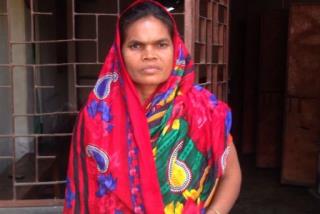Five families of ethnic indigenous Catholics are in a frustrating and helpless situation over an attempted eviction by a church’s officials in northern Bangladesh.
Officials of St. Peter’s Catholic Church in Musroil village of Rajshahi District have been pressuring the families to leave the land and property they have been living on for years.
They want to use the land to set up a convent for a congregation of nuns, local sources say.
St. Peter’s Church, which is under Rajshahi Diocese, was elevated to a parish in 2018 and has about 1,300 Catholics, mostly indigenous people. The parish was previously under Good Shepherd Cathedral Church of Rajshahi.
Hundreds of poor and landless Catholics in the area were provided with land and housing more than a decade ago during the time of parish priest Father Paolo Ciceri, an Italian missionary from the Milan-based Pontifical Institute for Foreign Missions (PIME).
Father Ciceri served in Bangladesh from 1973 to 2017, mostly in Rajshahi. He returned to Italy due to poor health in 2017.
The housing project was funded mostly by Father Ciceri’s family, relatives and friends in Italy. Although the church has ownership rights of the land, the families had verbal permission to live there permanently.
Anger and frustration
Two Catholic families told UCA News that they have moved out of their properties following pressure from St. Peter’s Church.
Other families complained that they had received several eviction notices from the church signed by parish priest Prodip Joseph Costa without a promise of adequate compensation.
UCA News has seen the eviction notices.
Mary Biswas, 40, a Paharia Catholic widow and mother of three, was forced out of her property in Musroil village at the end of February after church officials padlocked her house.
“Our family have been living here since the time of Father Ciceri, who allowed us to settle here permanently. After several notices, we have been forced to move out. We have received tiny compensation from the church, with which we cannot resettle in any other place,” Biswas told UCA News.
The family left the property after a final notice on Feb. 28 and are now living with their relatives, she said.
The family received 105,000 taka (US$1,234) in compensation, which is too little for resettlement, Biswas said.
“I used to be a train sweeper but due to sickness I have been unable to work for six months. My two sons are low-paid day laborers. We don’t have money to start all over again. We don’t want to live on the church property, but we want a guarantee of peaceful resettlement in another place,” she added.
`Unjust and unacceptable`
Edward Marandy, 52, a former seminarian and catechist who has a grocery shop, is also frustrated by the church’s move to take over his property.
When the ethnic Santal father of four didn’t have a permanent place to live with his family, Father Ciceri offered land and monetary support to build a house years ago.
“We built a brick house which cost 1.7 million taka. Father Ciceri donated 1.2 million taka and the rest I secured through a loan from the cooperative bank. We have told the church authority to offer us land and a full amount of compensation, but they didn’t agree,” Marandy told UCA News.
After a final notice ordering Marandy’s family to leave the property by March 12, church officials padlocked the house with one of his daughters inside on March 14, he alleged.
“We have no problem in leaving the property as long as we are offered permanent resettlement in another place with proper compensation. But the way we have been humiliated is absolutely unjust and unacceptable,” he said.
On 15 March, Marandy filed a complaint with a police station against the attempted eviction.
Serajum Monir, officer in charge of Chandrima police station, said police had visited the disputed sites and talked to all parties about the dispute. “We hope they will come to a solution through discussion,” he told UCA News.
The families of Mary Biswas and Edward Marandy have refrained from church liturgy and receiving Holy Communion because of the dispute. “I cannot take Communion from those people doing injustice to me,” Marandy said.
Church Officials Tightlipped
Contacted over the dispute, Bishop Gervas Rozario of Rajshahi declined to comment but referred UCA News to Father Paul Gomes, vicar general of the diocese. Father Gomes said he was unable to talk due to his “busy schedule.”
Parish priest Father Prodip Costa, who is at the center of the controversy, said he was “sick” and declined to talk to UCA News.
A senior PIME priest expressed dismay over the dispute.
“We don’t want to see the Church’s image tarnished due to unjust actions. It needs to make sure the faithful live in peace and justice. The current row and attempts to force out people without proper compensation are a grave injustice,” the priest told UCA News on condition of anonymity.














